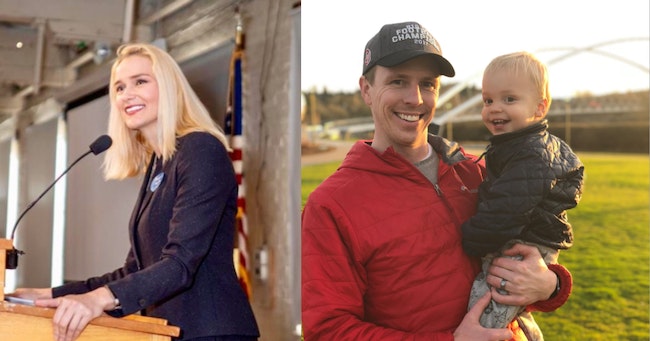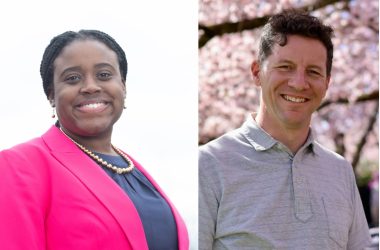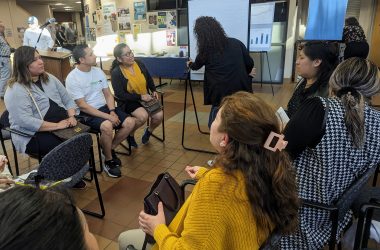 Vanessa Nordyke, left, and Reid Sund will interview with Salem City Council on Monday night to take the open seat. They responded to a short survey from Salem Reporter.
Vanessa Nordyke, left, and Reid Sund will interview with Salem City Council on Monday night to take the open seat. They responded to a short survey from Salem Reporter.
Who will represent southwest neighborhoods on Salem City Council? It could be a state lawyer or a hospital finance director. The decision may arrive tonight.
Vanessa Nordyke, an attorney with the state Department of Justice, and Salem Health Finance Director Reid Sund will make their cases to council’s current slate at 6 p.m. tonight at council chambers, 555 Liberty St. S.E.
The seat they vie for has been vacant since Oct. 1 following the resignation of Councilor Sally Cook. The term expires Dec. 31, 2020, so whomever councilors appoint is guaranteed one year.
READ: Heitsch withdraws candidacy from Salem City Council
Voters in 2020 will ultimately decide who wins the next four-year term.
With one guaranteed year on council, however, that person will face some important policy questions. Among those questions are how Salem should address its projected budget shortfall and whether to make it illegal to sit or lie down on public rights-of-way in a bid to curb homelessness downtown.
Salem Reporter reached out to the finalists to hear more about their goals and political hopes for the seat. The following are their written responses, some of which have been edited for clarity.
Why did you decide to put your name forward?
Nordyke: I decided to throw my hat into the ring because I have served the city in so many different capacities, through four different city committees. Each one gives me a different insight into how each parts of the city work.
Sund: I believe I’m a good fit for the position. I love Salem. I’m raising my family here. I have a financial background working for the largest employer here — Salem Health.
In your view, what are the city of Salem’s biggest issues?
Sund: It really comes down to fiscal responsibility. I’m the finance director, I know what it means to operate in a financial environment with significant downward pressure and rising costs. That’s healthcare. I’ve known for awhile (about the city’s budget concerns). When I was on a budget committee, they talked about these revenue options. I believe in a balanced budget, but a smaller government where necessary.
Nordyke: Livability. When you break down that term, I’m talking about: are neighborhoods safe? We had a recent shooting at the Goodwill. Are they safe for children to walk to school? Are we supporting parks? Are we supporting green spaces? Are we incentivizing affordable housing?
Homelessness has been a dilemma for Salem and many governments on the West Coast. Do you feel this is an issue local policymakers can play a role in fixing? What should or shouldn’t be done?
Sund: I care deeply about our friends facing the challenge of homelessness. This is an important issue for the city council to focus on, not just because it affects quality of life in Salem, but because I think it touches on the moral fabric of our society. While there are no easy solutions; we can do better. We need to have policies that get more affordable housing into the market.
The “housing first” model is working across the country to help people get back on track. It is also proven to have a return on investment for taxpayers.
We also need to continue to invest in wrap-around services that provide people with resources to navigate mental health and substance abuse challenges. We have a great community of problem-solvers in Salem and I would continue to work with them to put forth meaningful, tangible solutions that recognize the complexity of the issue.
Nordyke: Homelessness is driven by factors far beyond the ability of a small city like Salem to fully resolve; however, there are some things we can do, both because we can because we should. The city should ensure through coordination and technical assistance to social service providers, and our own financial resources, that no one in our community is who is a victim of domestic abuse or living in an unsafe environment should be without a safe place to live.
We also must use all of the policy tools available to us to maximize the amount of affordable housing available in Salem, as well as promoting density to ensure that housing costs don’t rise beyond our residents ability to pay for them.
The hardest challenge to address are the needs of the chronically homeless who face addiction, mental health, and other challenges. Some of the things we can do include bathrooms, showers, warming centers, and connections with services provided by community partners to life people out of homelessness.
When do you think it’s appropriate for city government to raise taxes or institute new fees? In the face of rising expenses, are there any services in Salem you think should be cut?
Nordyke: It’s appropriate to raise revenues when the city can clearly document that the services it currently provides are appropriate and cost-effective, and that any new or expanded services meet genuine needs in the community and can be provided efficiently
Taxes, fees and cuts are not our only options. Pursuing more federal grants can leverage more local resources. Performance auditing saves money and tells us whether government programs are delivering results, not to mention increases government efficiency, accountability and transparency.
Sund: I do not support the operating fee or the payroll tax based on what I know today.
Today, should a Climate Action Plan — which helps track and plan for ways to curb emissions — be a priority for the city of Salem? Why or why not?
Sund: I believe we should be responsible stewards of our environment as we create new policy. However, I believe climate is an issue that must primarily be addressed at the federal and global level in order to have significant impacts on the problem. Salem’s top priorities right now should be homelessness, the budget shortfall, and projected growth in our community.
Nordyke: Absolutely. Several cities already have a Climate Action Plan, and it’s high time we join them. We can and we should ask other cities what worked and didn’t work, and ask cities where they found the most bang for taxpayer buck. We can and we should seek buy-in and participation from our community. We can and we should incentivize renewable energy, green spaces, tree canopy, bicycling, public transit and walkable neighborhoods.
Where did you stand on the Salem River Crossing? Why?
Nordyke: The SRC has been decided. Right now, we can use our limited transportation dollars to ensure children get to school safely, people can walk and bike in their neighborhood safely, and we maintain the infrastructure we have now. We need fresh ideas, like incentivizing telecommuting, which does double-duty by reducing greenhouse gas emissions and traffic congestion.
And in the years to come, decision-makers can review additional river crossing capacity, but planners must set a realistic budget, invite input from the community, neighborhoods, and other stakeholders, and then consider all options — which should include the reality that many non-residents of Salem use the bridges.
Sund: I believe that Salem needs another bridge, given the growth of our community and projected growth coming. It’s important infrastructure for our economy, for public safety and for livability. An additional bridge was supported by many of the surrounding communities and is important to bring the infrastructure needed to support our growth. Traffic congestion has become worse and it’s not improving, and we are also an important gateway to the Willamette Valley for coastal Oregon.
Have a tip? Contact reporter Troy Brynelson at 503-575-9930, [email protected] or @TroyWB.









